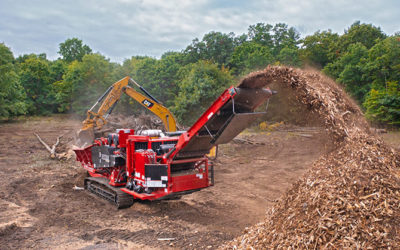Research Shows Thinning Benefits Bees, Forests
Researchers in Colorado over a 10 year period have determined that forest thinning opens up canopies and benefits key tree pollinators by allowing more flower and shrub species that attract and sustain bee populations. Biologists from Colorado State and Utah State studied 15 thinned and 15 unthinned forest plots and found more species diversity and better overall forest health in the thinned tracts.
The researchers were also able to identify key pollinator plant species such as blue mist penstemon, field chickweed, pineywoods geranium and others and recommend that resource managers seed forests with them to promote a robust pollinator network that benefits all plant species.
Latest News
New From Bandit: HM6420 Hammermill Grinder
This highly productive 40 in. capacity grinder is designed and manufactured to be an alternative solution for those grinding applications that may contain contaminants. A Caterpillar C32, 1,200 HP engine provides ample torque and horsepower for optimal machine performance and productivity. The heart of the HM6420 is a 50 in. x 66 in. wide hammermill. The heavy-duty mill features a 1.75 in. drum skin custom formed from rolled plate. The mill is supported by a 7 in. main shaft constructed of alloy steel that has been ultrasonic tested…
WANT MORE CONTENT?
Spanning seven decades since its inception in 1952, Timber Harvesting highlights innovative and successful logging operations across the U.S. and around the world. Timber Harvesting also emphasizes new technology and provides the best marketing vehicle for the industry’s suppliers to reach the largest number of loggers in North America and beyond.
Call Us: 800.669.5613

